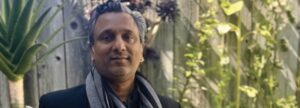
by Vivek Anand
Any occasion provides the opportunity to reflect and align oneself. Having listened to me sing with Sukhawat Ali at the Integral Yoga Institute and then at a solo show in Noe Valley, brother Snehan excitedly said to me in mid-August, “We typically have kirtan here, but we have not had classical music. If you can create bhaava or emotion with this music, we want to offer it to our community!” So I began to think about how to honor this invitation through creating a concert of khayaal and spiritual music.
I will be presenting a concert called Union and Renunciation – Jog aur Tyaag, Songs exploring the Connection between Romantic Love and Transcendence. Many of you know that Jog or Yoga is a joining, a Union, whereas Tyaag is a letting go, a Renunciation. The songs will explore both themes in dialogue with each other, through romantic and reflective ragas and lyrics.
Our musical choices of raga and bandish in South Asian music are often tied to a time of day or night, season, mood, events, a response to an energy in the room. Thus, I thought to explore Yoga in this concert through the music, and I reflected on it as a discipline, union, a joining, a way of being in the world but not of it. There’s a beautiful raga called Jog, very meditative, ‘bluesy’, with some beautiful use of shuddha ga and komal ga in the language of sargam, or ‘mi’ and ‘me’ in the language of solfège, and there is a beautiful romantic raga called Bihaag, pentatonic in the ascent and heptatonic in the descent, and using both a shuddha ma and a tivra ma or a ‘fa’ and ‘fi’ in solfège. I thought to sing these ragas as well as some others. Now this can sound intellectual, but I assure you that it isn’t, in the singing or the experience! It’s just the beautiful complexity of music devised from seven notes.
The lyrics to the raga, bring out the feeling as well, beginning with the opening of the song I plan to sing in Raag Jog.
Jog swara ko karein, bhoga rasa karein, roga bhaava ko harein.
Let’s sing the notes of Jog, of union; let’s taste pleasure, worldly and mystical; let’s prevail over illnesses of the mind.
In addition to being a singer, I’m also a psychotherapist. Right now, we have been involved in an election, and are also witnessing great injustices in the world, so it’s worth thinking about what is health and ‘illness of the mind’. I don’t believe that health is a state of smiling and detached happiness, nor do I believe that it is a state of being overwhelmed and paralyzed by events. I imagine that the absence of illness (or the absence of disconnectedness) is about being able to access pain, empathy, finding the pleasure in simple things, every moment, in a state of alignment with reality. Health includes feeling and being connected in deeper ways.
This is what the music gently encourages us to pursue: to align ourselves through singing, playing an instrument, resonating and vibrating with these notes and melodies, diving into the words, and having a transformative experience which changes you and your experience in the world. Sometimes it gives language and sound to your feelings so that you don’t have to suffer in silence.
The romantic composition in Bihaag goes:
Ab ghar aavan kahi gaye Mohan, ajahuna aaye morey priyatam, ati dukha paayo mora tan, mora man
Krishna/Mohan said he would be back, he hasn’t returned, I ache in my body and mind.
Both romantic love and the longing for union with the Divine have a similar feeling. The sense of loneliness and viraha are hard to bear. We make room for expressing this pain and desire through this plaintive song, written by the eighteenth century musical composer and artist Naimat Khan, whose pen name was Sadarang (literally ‘eternal color’). The song is followed by melodic variations, and then by a tarana which is a fast composition with rhythmic syllables. Perhaps the tarana reminds one of the restlessness of waiting, and offers relief from the pain of separation in love.
Raha takat mori ratiya beeti, taarey ginat, ginat aru doojey, Sadarang biraha satavey.
I spent the night awaiting his return, counted stars, Sadarang is troubled by loneliness.
Join Vivek Anand in a Hindustani Vocal Concert: Jog aur Tyaag, in-person, Saturday, November 23 from 7:00 pm – 8:30 pm PST.
 Vivek Anand is a vocalist with a focus on emotional and spiritual meaning. He is also a poet, lyricist and life-long student, practitioner and champion of South Asian Classical/Hindustani Classical vocal traditions. Vivek has studied and sung with his guru, Rita Sahai (vocalist of the Seni Alāuddin Gharānā and Benāres Gharānā, and accomplished student of Ustad Ali Akbar Khan) for the last twenty-five years, and with his ustad, Sukhawat Ali Khan (vocalist of the Shām Chorasi Gharānā, and son of Ustad Salamat Ali Khan) for the last sixteen years. Through this training he has acquired his emotional and spiritual focus, a knowledge of rāgas, composition, lyric writing, elaboration, rhythm, and language. His extensive repertoire includes Hindustani classical, semi-classical, bhajans, Sufi songs, ghazals, and raga-based collaborations with jazz and world musicians.
Vivek Anand is a vocalist with a focus on emotional and spiritual meaning. He is also a poet, lyricist and life-long student, practitioner and champion of South Asian Classical/Hindustani Classical vocal traditions. Vivek has studied and sung with his guru, Rita Sahai (vocalist of the Seni Alāuddin Gharānā and Benāres Gharānā, and accomplished student of Ustad Ali Akbar Khan) for the last twenty-five years, and with his ustad, Sukhawat Ali Khan (vocalist of the Shām Chorasi Gharānā, and son of Ustad Salamat Ali Khan) for the last sixteen years. Through this training he has acquired his emotional and spiritual focus, a knowledge of rāgas, composition, lyric writing, elaboration, rhythm, and language. His extensive repertoire includes Hindustani classical, semi-classical, bhajans, Sufi songs, ghazals, and raga-based collaborations with jazz and world musicians.
 Vivek Anand is a vocalist with a focus on emotional and spiritual meaning. He is also a poet, lyricist and life-long student, practitioner and champion of South Asian Classical/Hindustani Classical vocal traditions. Vivek has studied and sung with his guru, Rita Sahai (vocalist of the Seni Alāuddin Gharānā and Benāres Gharānā, and accomplished student of Ustad Ali Akbar Khan) for the last twenty-five years, and with his ustad, Sukhawat Ali Khan (vocalist of the Shām Chorasi Gharānā, and son of Ustad Salamat Ali Khan) for the last sixteen years. Through this training he has acquired his emotional and spiritual focus, a knowledge of rāgas, composition, lyric writing, elaboration, rhythm, and language. His extensive repertoire includes Hindustani classical, semi-classical, bhajans, Sufi songs, ghazals, and raga-based collaborations with jazz and world musicians.
Vivek Anand is a vocalist with a focus on emotional and spiritual meaning. He is also a poet, lyricist and life-long student, practitioner and champion of South Asian Classical/Hindustani Classical vocal traditions. Vivek has studied and sung with his guru, Rita Sahai (vocalist of the Seni Alāuddin Gharānā and Benāres Gharānā, and accomplished student of Ustad Ali Akbar Khan) for the last twenty-five years, and with his ustad, Sukhawat Ali Khan (vocalist of the Shām Chorasi Gharānā, and son of Ustad Salamat Ali Khan) for the last sixteen years. Through this training he has acquired his emotional and spiritual focus, a knowledge of rāgas, composition, lyric writing, elaboration, rhythm, and language. His extensive repertoire includes Hindustani classical, semi-classical, bhajans, Sufi songs, ghazals, and raga-based collaborations with jazz and world musicians.
